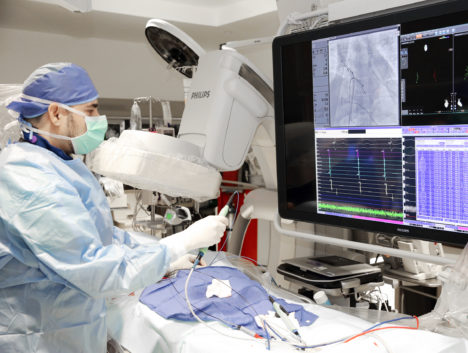Electrophysiology
Electrophysiology is the specialty of cardiology that focuses on the heart’s electrical system. The heart sends electrical signals that controls the rate and rhythm of the heartbeat.
Arrhythmias
An arrhythmia is an irregular heartbeat caused when the electrical signals in the heart don’t function properly. There are several types of arrhythmias including:
Atrial Fibrillation (AFib) With AFib, irregular electrical signals cause the heart’s upper chambers (atria) to beat quickly. The atria quiver instead of fully contracting. As a result blood can pool in the atria instead of moving down into the lower heart chambers (ventricles). This increases the risk of a possible blood clot and stroke.
SVT (Supraventricular Tachycardia) A rapid heartbeat of over 100 bpm, cause by irregular electrical signals, originating in the upper heart chambers (atria). In many cases, people with SVT do not require medical attention. However, prolonged and frequent episodes of SVT may require treatment.
Ventricular Tachycardia (VT) A rapid heartbeat of over 100 bpm, caused by irregular electrical signals, originating in the lower heart chambers (ventricles). This rapid heartbeat can prevent the ventricles from filing up with a sufficient amount of blood to pump out to the rest of the body.
EP (Electrophysiology) Study
During an EP study, an electrophysiologist inserts a catheter (long thin tube) into the patient’s femoral vein in their groin, and guides it to the heart. 3-5 catheters are inserted and placed in different areas inside the heart. These specialized electrode catheters sense the heart’s electrical activity and send signals to EKG monitors. The doctor may send an electrical signal through the catheter to trigger an abnormal heartbeat, so that it can be studied. From the findings of the EP study, the doctor can determine the source and cause of the abnormal heartbeat and decide on the best course of treatment.



